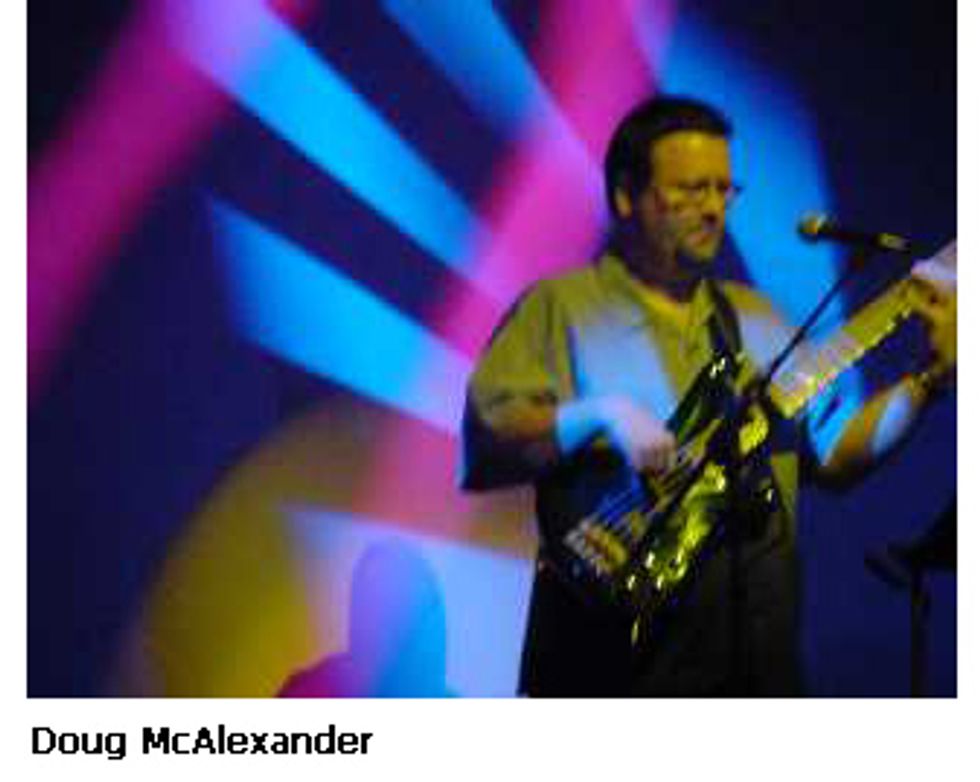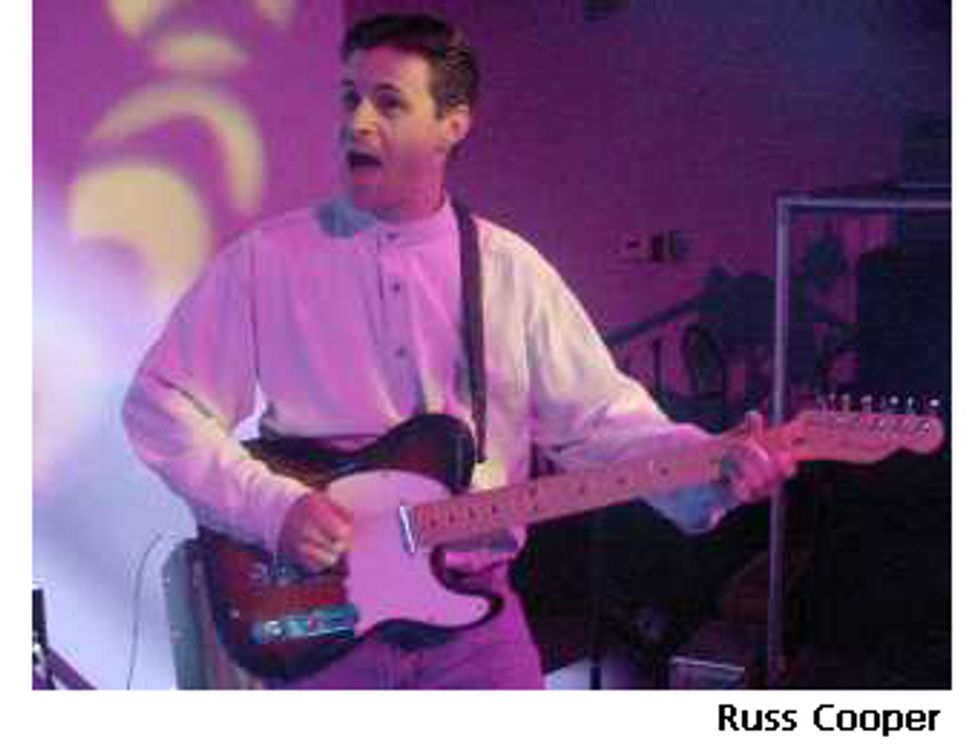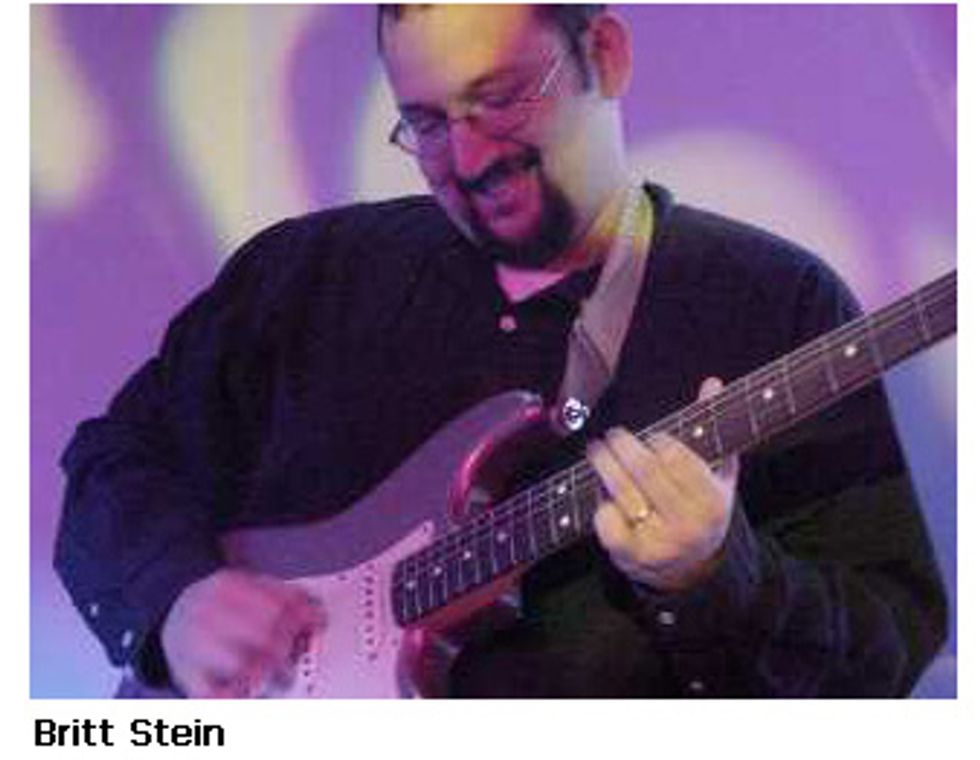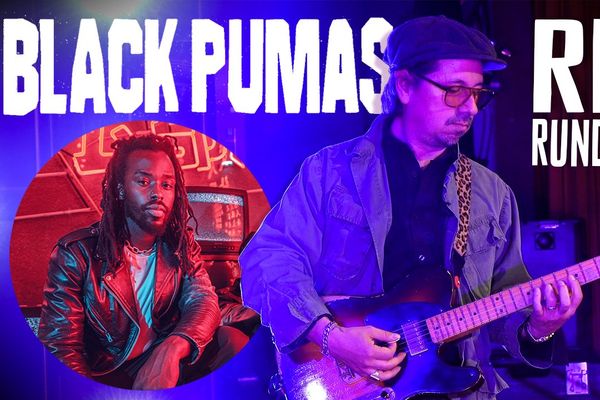Reinventing the weekend warrior
Doug McAlexander, Russ Cooper and Britt Stein have landed the perfect gig. They feed their families with full time jobs during the week, while supplementing their income by playing the music they love on great boutique gear on the weekends in front of thousands of people. They don’t have to deal with smoky bars, drunken fans or questionable bookings in seedy neighborhoods. Best of all, their work has meaning.
Bassist Doug and guitarists Russ and Britt are three members of the worship band, CrossTalk. Playing together since 2000, their work is somewhat unusual. Instead of just playing at their home church, their goal is to help other churches incorporate contemporary worship into their services. Whether this is a four-year in-house stint, like they finished in August, 2007, or helping match churches with musicians, CrossTalk makes the music happen.
The members of the band pride themselves on musical excellence, eschewing the “make a joyful noise” mantra that is often used to cover mediocre musicianship in churches. Each hones their craft and strives for the perfect tone – picking of loads of custom and boutique gear in the process. We sat down with God’s gearheads to talk about what brought them here, why rock is important to church, and where the music is headed.

Doug McAlexander: Well, I’ve been playing since 1979. Some of the guys have been touring musicians in other genres, not Christian music. One guy is coming from a country background, and another is coming from a rock background, which is kind of good, because our original music is a blend. It’s what we call “musician’s music.” We play the standard praise music you hear on the radio, but we also play our own material, what you might call Southern Rock. It’d be like Allman Brothers, Lynard Skynard or Atlanta Rhythm Section doing Christian music.
Russ Cooper: I was six or seven when I first picked up guitar. My mother gave me one for my birthday. We’ve always had a piano around the house, and we basically had every instrument on God’s Earth in my living room that was bought from the pawn shop. I grew up in the ‘80s, so I had that hair metal band influence, but I grew up in the church – my parents were devote Christians. I had influences from both ends, but without the sex and drugs.
Britt Stein: I grew up on everything from classic rock to ‘80s rock. I’m definitely a child of the ‘80s, for better or worse. I liked all the guitar rock in the ‘80s, plus Hendrix, Clapton, Jeff Beck, Led Zeppelin, Van Halen and The Who. I got involved with worship music probably ten years ago. My brother-in-law introduced me to that side of playing. I had been playing since about ’84, mostly in cover bands, but some original bands. It wasn’t professional – kind of hobbyist stuff. Obviously we tried to do it with excellent quality, but any money we made went back into the band.
Do you guys have day jobs or are you professional musicians?
RC: I categorize myself as a professional musician with a day-job. It’s hard to have a wife and three kids and be a professional musician – especially when your wife stays at home and takes care of the kids.
BS: Yes, I have a full time job. The playing is kind of an outlet, and really just a semi-pro thing.
Do any of you guys play outside of CrossTalk?
BS: Yes, I play in a wedding band named Mix Company 2000, or MC 2k, and we do weddings and corporate gigs. It’s a part-time gig, and this year has been a little slow. We’re doing nice gigs, but there are just not a lot of them. I also play in a contemporary Christian group with my brother-in-law. We play in prisons, and it’s our main form of outreach
What kind of things are CrossTalk involved in?
DM: We usually play every week for churches, and we also do coffeehouses and street ministries – different types of outreach.
When you come into a church to play, how does that work?
RC: Sometimes churches don’t have the budget to hire a full-time worship leader, so we say, we’ll give you a whole band, pre-rehearsed for the price of a worship leader, and you don’t have to worry about anything.
DM: We explore their needs with them. Sometimes they just need supplemental musicians, and I have professionals available for that. Sometimes they’re looking for a total turnkey solution, including sound equipment, and we can do that as well. Sometimes they just want a worship leader. Sometimes you’re dealing with the pastor because they don’t have a minister of music, and in that scenario, you’re dealing completely with the pastor. We have had a situation where we’re dealing with a music minister, and he simply wants the band to back him. And in that case, our lead singer will focus on keyboards and guitars. We’re just trying to meet the needs of the church, whatever they may be.
Do you guys work with churches to create praise bands?
RC: Sure, we’ve done that in the past and we still do that when were called upon.

DM: There’s been a debate. I was touring in Christian music in the ‘80s, and if guys today feel like somebody thinks they’re a little edgy, they should have tried touring in the ‘80s! Even songs by guys like Dallas Holm and Bob Bennett were considered “too much.”
We have a little bit of sentiment left over from that, but for the most part contemporary Christian music has taken over, and some older members of congregations feel a little betrayed. Some of these folks have a good attitude about it; they go to church and tolerate the music, but some of them do have a bad attitude. There will be a clash from time to time and I’ve seen churches split because of it, having a traditional service and a contemporary service. A lot of churches do “blended” services, where they do a combination of traditional music and contemporary music, and I think that’s the proper attitude.
BS: People are more accepting, especially in more contemporary settings – though some churches still don’t accept drums. Contemporary is a really relative term when talking about musical styles and what is secular and what is Christian. Some people think that if a song has some sort of beat to it or gets heavy it’s no longer Christian. That’s tough for me, because I don’t think there should be any musical differences between the two.
How do you approach volume in a church setting?
RC: Well, it depends on the venue. Different churches have different types of worship. Locally, we have North Point Community Church, whose bread and butter is rock music – a “if it’s too loud, you’re too old” type of place. So, it ranges from that to a small country church where you better watch your volume. Where I am at now, we generally just turn the amps around, mic them and crank the tubes; it’s not as loud as I want, but it’s not as quiet as it used to be.
DM: When you’re doing a church on Sunday morning, you’ve got to be more sensitive about volume. In fact, in church situations, we frequently use an in-ear system. You may still have an amp on stage, but you’re probably not running it very loud.
BS: I’m not somebody who has a volume limit, but of course everyone has their own idea of what’s too loud. For a lot of churches volume is a huge issue. There are all age groups there, and they don’t want to single anyone out for being too loud.
How do you guys determine what kind of tone you’re going for?
RC: We don’t go into a situation and say we want this type of tone or that type of tone. Britt, is great. I know what he’s going to do before he does it and he knows what I’m going to do before I do it. We always talk tone, and our tone keeps evolving year after year. We just dial it in to where we think it sounds great and go for it.
DM: I’ve never had anyone tell me that I need to sound different. I’ve had worship leaders ask me if I can make specific noises, but that’s about it. I think I have a decent enough tone going in there that it doesn’t stick out like a sore thumb.
What kinds of gear are you guys into?
BS: I’ve have an American Strat with DiMarzio Virtual Vintage pickups, a Strat with DiMarzio single coils and a Tele with DiMarzios as well. I have two Ibanezes with Seymour Duncans – one has two humbuckers and the other has single coils. Just about everything I have I’ve dropped different pickups in, sometimes multiple times!
My newest amp purchase is a Genz Benz Black Pearl. It’s a Class A 30-watt amp, and it has different amps to run it at lower wattages. It’s a head, which I run through 2x12 cabinets from a company called Avatar. The speakers are Celestions.
I have an RMC Picture Wah, a Barber Tone Press compressor and Launch Pad boost pedal. Those have been on there for a few years. I previously had a modded Keeley compressor and a four-knob Keeley compressor, but this Barber compressor works with everything – high-gain or low-gain.
RC: I have a ‘97 model Strat Lonestar with Seymour Duncan Pearly Gates. I play through a pedalboard with pedals from MI Audio, Barber, and a little H2O pedal. I usually play through a hot-rodded Classic 30.
DM: Well, I play custom-made basses, and I have 13. I play fretless bass – it almost sings. I also play fretted bass. I like Roscoe basses, made in Greensborough, North Carolina by a guy named Keith Roscoe, and I have five of those. I also like Michael Tobias Designs (MTD). The MTD series is all hand-made by Michael and a couple helpers. I play boutique gear; I don’t just go to a music store and pick something off the rack.
I also play Thomastik-Infeld strings, which are hand-made in Austria. Most of the guys I’m in contact with have gotten hooked on those strings. My speaker cabinets are made by some Princeton University physics professors – they’re called Euphonic Audio. They’re incredible – lots of your higher level players are using them. They don’t color the tone of the instrument. The cabinets are very small; people can’t believe how loud they are. As the bass head, I’m using a boutique amp called a Thunder Funk, made by a guy named Dave Funk who has worked on the space shuttle and the F16 when he was doing government contract work.
You guys sound like you’re pretty into the gear, do you see that a lot in the church atmosphere?
BS: It depends. The church I go to now, they use Line 6 stuff for the most part. Lincoln Brewster, who is just phenomenal – from what I understand he owns a lot of vintage gear, but when he travels and plays at churches, he plays through a Floor POD. Far be it from me to criticize that when he gets awesome tones. He proves that tone is all in the fingers. But I think he has some great patches on there – he spent a lot of time developing some solid sounds.

DM: I try to keep an open mind about that, because in the ‘80s when I was playing, there were people who thought we were of the devil. There were churches that wouldn’t even allow drums or a synthesizer in the building. Personally, those styles are not my cup of tea, but what’s important is whether the message is getting through. I have a son who is 22 and a daughter who is 19, and I would ask, as their stereo was blasting, “What in the world are you listening to?” And they would say “It’s Christian.” But when I asked them what the message was, they couldn’t tell me. My only criticism, regardless of the style, is does it communicate?
When Isaac Watts started introducing meter into hymns, it was rejected in the same way contemporary music has been rejected: because it was new and different. People thought it was evil, because it introduced an autonomic response in the body – it made you tap your foot and getting into the beat. What we now hold as sacred hymns were once considered contemporary music. So it’s funny to see how cyclical things can be. If the message is there, it might reach somebody that standard church music may not reach.
BS: When I first got into playing at church, I kind of held back because I was afraid of playing rock music at church, even though I had played in a hard rock Christian band before I started playing churches. But now I do incorporate classic rock roots into my playing – I definitely like the hard-driving rock.
What about guitar solos?
BS: We’ve been in situations where people accused us of being more concerned with the technical instead of the spiritual. It’s the same in secular music – if it adds something to the song, then it should be there, whether it’s a complete solo or just some riffs. If the person is up there and their motives are to serve God, I don’t see a problem.
It’s a tricky question though. There are a lot of different opinions on the topic – is that person just showing off, or is it all about them? I grew up loving guitar solos. And I will say this, when we play prisons, they love to hear it. It draws them in. We just crank it up and play our hearts out, and a lot of guys tell their buddies. As long as it doesn’t take away from the worship, I see no problem with it.
Where do you see Christian music and worship music going from here?
BS: Well, when I got into it, there was already Christian hard rock. It seems that over a ten year period there’s been the same kind of changes as secular music. In the churches, music has become more contemporary. There are more guitars.
RC: Gosh, that is a hard question. Where is the future? I hope it’s where the musicians and the worship leaders strive for excellence for the right reasons, because my belief has always been that God has given me a talent and I should use it the best that I can. And I think that everyone who has been given that talent should do it the same way. I hope music ministers and church musicians can get into a mindset where they do it the best they possibly can for our Lord.
I see the music going in cycles, and the trend has always been that the secular music scene is a step ahead and I think that’s because they’re willing to go out and do new things. I think that churches lag behind because they’re afraid of change. I think we’ll always see that cycle with the secular world, musically. In churches, you’ll see a big boom whenever the music scene catches back up with the secular scene and people become interested in the music. I think that music has a huge impact on people coming to church, so that’s why I’m so passionate about it and so passionate about doing it right.
To see live video of CrossTalk, check out their song list, or learn more visit praiseandworshipband.com.
